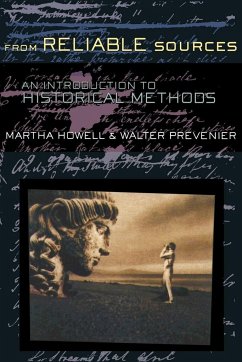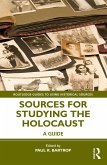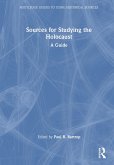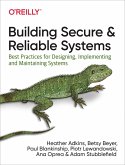- Broschiertes Buch
- Merkliste
- Auf die Merkliste
- Bewerten Bewerten
- Teilen
- Produkt teilen
- Produkterinnerung
- Produkterinnerung
A lively introduction to historical methodology, an overview of the techniques historians must master in order to reconstruct the past.
Andere Kunden interessierten sich auch für
![Sources for Studying the Holocaust Sources for Studying the Holocaust]() Sources for Studying the Holocaust38,99 €
Sources for Studying the Holocaust38,99 €![Sources in the History of Psychiatry, from 1800 to the Present Sources in the History of Psychiatry, from 1800 to the Present]() Sources in the History of Psychiatry, from 1800 to the Present132,99 €
Sources in the History of Psychiatry, from 1800 to the Present132,99 €![Sources for Studying the Holocaust Sources for Studying the Holocaust]() Sources for Studying the Holocaust177,99 €
Sources for Studying the Holocaust177,99 €![Sources and Methods in Indigenous Studies Sources and Methods in Indigenous Studies]() Sources and Methods in Indigenous Studies152,99 €
Sources and Methods in Indigenous Studies152,99 €![Sources and Methods in the History of Sexuality Sources and Methods in the History of Sexuality]() Sources and Methods in the History of Sexuality40,99 €
Sources and Methods in the History of Sexuality40,99 €![Solubilities Of Inorganic And Organic Substances; A Handbook Of The Most Reliable Quantitative Solubility Determinations Solubilities Of Inorganic And Organic Substances; A Handbook Of The Most Reliable Quantitative Solubility Determinations]() Atherton SeidellSolubilities Of Inorganic And Organic Substances; A Handbook Of The Most Reliable Quantitative Solubility Determinations28,99 €
Atherton SeidellSolubilities Of Inorganic And Organic Substances; A Handbook Of The Most Reliable Quantitative Solubility Determinations28,99 €![Building Secure and Reliable Systems Building Secure and Reliable Systems]() Ana OpreaBuilding Secure and Reliable Systems80,99 €
Ana OpreaBuilding Secure and Reliable Systems80,99 €-
-
-
A lively introduction to historical methodology, an overview of the techniques historians must master in order to reconstruct the past.
Hinweis: Dieser Artikel kann nur an eine deutsche Lieferadresse ausgeliefert werden.
Hinweis: Dieser Artikel kann nur an eine deutsche Lieferadresse ausgeliefert werden.
Produktdetails
- Produktdetails
- Verlag: Cornell University Press
- A Translation and Adaptation of "Uit goede bron" b
- Seitenzahl: 224
- Erscheinungstermin: 27. April 2001
- Englisch
- Abmessung: 228mm x 152mm x 13mm
- Gewicht: 344g
- ISBN-13: 9780801485602
- ISBN-10: 0801485606
- Artikelnr.: 22473420
- Herstellerkennzeichnung
- Libri GmbH
- Europaallee 1
- 36244 Bad Hersfeld
- gpsr@libri.de
- Verlag: Cornell University Press
- A Translation and Adaptation of "Uit goede bron" b
- Seitenzahl: 224
- Erscheinungstermin: 27. April 2001
- Englisch
- Abmessung: 228mm x 152mm x 13mm
- Gewicht: 344g
- ISBN-13: 9780801485602
- ISBN-10: 0801485606
- Artikelnr.: 22473420
- Herstellerkennzeichnung
- Libri GmbH
- Europaallee 1
- 36244 Bad Hersfeld
- gpsr@libri.de
Martha Howell is Professor of History at Columbia University. Her previous books include The Marriage Exchange: Property, Social Place, and Gender in Cities of the Low Countries. Walter Prevenier is Emeritus Professor of History at the University of Ghent (Belgium) and the author or coauthor of numerous books, including The Promised Lands: The Low Countries under Burgundian Rule.
I. The Source: The Basis of Our Knowledge about the Past
A. What Is a Source?
B. Source Typologies, Their Evolution and Complementarity
C. The Impact of Communication and Information Technology on the Production
of Sources
D. Storing and Delivering InformationII. Technical Analysis of Sources
A. Clio's Laboratory
Paleography
Diplomatics
Archaeology
Statistics
Additional Technical ToolsB. Source Criticism: The Great Tradition
The "Genealogy" of the Document
Genesis of a Document
The "Originality" of the Document
Interpretation of the Document
Authorial Authority
Competence of the Observer
The Trustworthiness of the ObserverIII. Historical Interpretation: The
Traditional Basics
A. Comparison of Sources
B. Establishing Evidentiary Satisfaction
C. The "Facts" That MatterIV. New Interpretive Approaches
A. Interdisciplinarity
The Social Sciences
The HumanitiesB. The Politics of History Writing
The Annales
The "New Left" and New Histories
The New Cultural HistoryV. The Nature of Historical Knowledge
A. Change and ContinuityB. Causality
Causal Factors (Religious Ideology, Clericalism, and Anticlericalism;
Social and Economic Factors; Biology and "Race"; Environment; Science,
Technology, and Inventions; Power; Public Opinion and the Mass Media)
The Role of the IndividualC. History Today
The Problem of Objectivity
The Status of the "Fact"Research BibliographyIndex
A. What Is a Source?
B. Source Typologies, Their Evolution and Complementarity
C. The Impact of Communication and Information Technology on the Production
of Sources
D. Storing and Delivering InformationII. Technical Analysis of Sources
A. Clio's Laboratory
Paleography
Diplomatics
Archaeology
Statistics
Additional Technical ToolsB. Source Criticism: The Great Tradition
The "Genealogy" of the Document
Genesis of a Document
The "Originality" of the Document
Interpretation of the Document
Authorial Authority
Competence of the Observer
The Trustworthiness of the ObserverIII. Historical Interpretation: The
Traditional Basics
A. Comparison of Sources
B. Establishing Evidentiary Satisfaction
C. The "Facts" That MatterIV. New Interpretive Approaches
A. Interdisciplinarity
The Social Sciences
The HumanitiesB. The Politics of History Writing
The Annales
The "New Left" and New Histories
The New Cultural HistoryV. The Nature of Historical Knowledge
A. Change and ContinuityB. Causality
Causal Factors (Religious Ideology, Clericalism, and Anticlericalism;
Social and Economic Factors; Biology and "Race"; Environment; Science,
Technology, and Inventions; Power; Public Opinion and the Mass Media)
The Role of the IndividualC. History Today
The Problem of Objectivity
The Status of the "Fact"Research BibliographyIndex
I. The Source: The Basis of Our Knowledge about the Past
A. What Is a Source?
B. Source Typologies, Their Evolution and Complementarity
C. The Impact of Communication and Information Technology on the Production
of Sources
D. Storing and Delivering InformationII. Technical Analysis of Sources
A. Clio's Laboratory
Paleography
Diplomatics
Archaeology
Statistics
Additional Technical ToolsB. Source Criticism: The Great Tradition
The "Genealogy" of the Document
Genesis of a Document
The "Originality" of the Document
Interpretation of the Document
Authorial Authority
Competence of the Observer
The Trustworthiness of the ObserverIII. Historical Interpretation: The
Traditional Basics
A. Comparison of Sources
B. Establishing Evidentiary Satisfaction
C. The "Facts" That MatterIV. New Interpretive Approaches
A. Interdisciplinarity
The Social Sciences
The HumanitiesB. The Politics of History Writing
The Annales
The "New Left" and New Histories
The New Cultural HistoryV. The Nature of Historical Knowledge
A. Change and ContinuityB. Causality
Causal Factors (Religious Ideology, Clericalism, and Anticlericalism;
Social and Economic Factors; Biology and "Race"; Environment; Science,
Technology, and Inventions; Power; Public Opinion and the Mass Media)
The Role of the IndividualC. History Today
The Problem of Objectivity
The Status of the "Fact"Research BibliographyIndex
A. What Is a Source?
B. Source Typologies, Their Evolution and Complementarity
C. The Impact of Communication and Information Technology on the Production
of Sources
D. Storing and Delivering InformationII. Technical Analysis of Sources
A. Clio's Laboratory
Paleography
Diplomatics
Archaeology
Statistics
Additional Technical ToolsB. Source Criticism: The Great Tradition
The "Genealogy" of the Document
Genesis of a Document
The "Originality" of the Document
Interpretation of the Document
Authorial Authority
Competence of the Observer
The Trustworthiness of the ObserverIII. Historical Interpretation: The
Traditional Basics
A. Comparison of Sources
B. Establishing Evidentiary Satisfaction
C. The "Facts" That MatterIV. New Interpretive Approaches
A. Interdisciplinarity
The Social Sciences
The HumanitiesB. The Politics of History Writing
The Annales
The "New Left" and New Histories
The New Cultural HistoryV. The Nature of Historical Knowledge
A. Change and ContinuityB. Causality
Causal Factors (Religious Ideology, Clericalism, and Anticlericalism;
Social and Economic Factors; Biology and "Race"; Environment; Science,
Technology, and Inventions; Power; Public Opinion and the Mass Media)
The Role of the IndividualC. History Today
The Problem of Objectivity
The Status of the "Fact"Research BibliographyIndex








